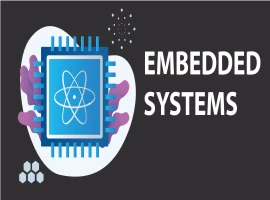Course Includes:
- Mode: Offline\Online
- Language: English\Hindi
- Certificate: Yes
- Project Certificate: Yes
The Internet of Things (IoT) is a revolutionary concept that involve connecting everyday objects to the internet, allowing them to collect and share data. Equipped with sensors and communication interfaces, IoT devices enable seamless interactions, generating real-time information for enhanced efficiency. From smart homes to industrial processes, IoT transforms diverse sectors, optimizing decision-making and automating tasks. IoT's influence extends across industries, promising a more intelligent and connected world, where data-driven insights reshape how we live and work.
Week 1: Introduction to IoT and Embeded System
Day 1-2: Introduction to IoT:-
Day 3-4
Day 5-6
Week 2 : Programming Basic for Arduino IDE
Day 1-2
Day 3-4
Day 5-6
Week 3:-Communication Protocols
Day 1-3 (Wireless) with practical exercise
Day 3-4 (Networking Protocols)
Day 5-7 (Modules)
Week 4:- Introduction to Node –MCU (ESP8266)
Day 1-2
Day 3-4
Day 5-6
Final Project Presentation
4 Week Course Content
+
Week 5: Introduction to Arduino cloud service
Day 1-2
Day 3-4
Day 5-6
Week 6: Introduction to Raspberry Pi
Day 1-2
Day 3-4
Day 5-6
IoT is a network of interconnected devices that communicate and share data. Learning about IoT is crucial as it underlies the technology shaping our increasingly connected world, influencing industries and daily life.
While prior programming knowledge is beneficial, this course is designed for beginners. It covers fundamental programming concepts necessary for understanding and implementing IoT applications.
The course provides hands-on experience, covering essential IoT components such as sensors, communication protocols, and cloud integration. This practical knowledge is directly applicable to real-world IoT project development.
Absolutely. The course explores diverse IoT applications, making the skills acquired applicable across various industries, including healthcare, manufacturing, smart cities, and more.
Basic hardware requirements will be outlined in the course materials. Participants can acquire the necessary components from local electronics stores or online platforms.
Yes, participants will have access to course materials, including presentations, code samples, and additional resources for future reference.
Basic understanding of programming and a curiosity about the IoT landscape will be beneficial.
Yes, the course includes discussions on emerging trends like edge computing, AI integration, and energy efficiency, ensuring participants are informed about the latest developments in IoT.
The skills acquired in this course align with the increasing demand for IoT expertise. Participants can apply this knowledge to pursue careers in IoT development, consulting, or contribute to innovative projects within their current roles.

The Internet of Things (IoT) is a revolutionary concept that...

Robotics, a transformative fusion of engineering, AI, and mechanics, encapsulates the creation of versatile machines that navigate the physical rea...

Embedded systems are the unsung heroes of the modern world. These specialized computing systems, hidden within everyday devices, empower our interc...

PLC (Programmable Logic Controller):